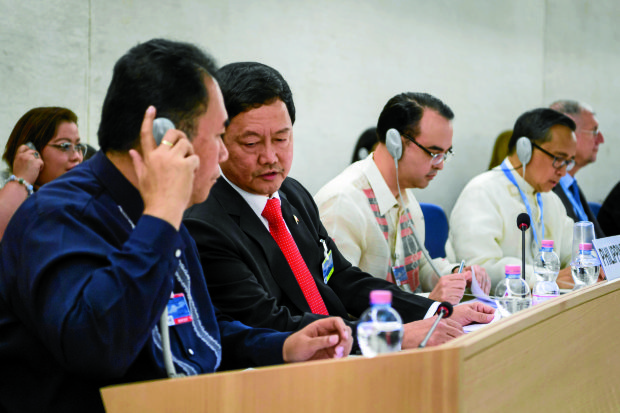PH delegation faces UN human rights reviewers
[ventuno id=’OTMyMjMyfHwyMzY4fHwxMDg2fHwxLDIsMQ==’][/ventuno]
GENEVA—Countries across the world put the Philippines on notice over its deadly war on drugs on Monday, demanding an end to extrajudicial killings by President Rodrigo Duterte’s security services.
Diplomats from all continents condemned the reported surge of deaths during so-called antidrug operations, which have claimed thousands of lives since Mr. Duterte took office at the end of June last year.
The Philippines is one of 14 countries whose human rights records are being examined by the United Nations Human Rights Council, part of a process known as the Universal Periodic Review (UPR) of all 193 UN member states.
The Philippines currently has a seat on the 47-member council, which also includes Britain, China, Cuba, Egypt, Germany, Saudi Arabia and the United States.
War on drugs, death penalty
Mr. Duterte’s brutal war on drugs and his administration’s moves to restore the death penalty went up for discussion on Monday.
Leading the Philippine delegation to the review, Sen. Alan Peter Cayetano briskly defended Mr. Duterte’s human rights record, saying his government always “seeks to uphold the rule of law.”
Cayetano came before the council equipped with a slide show and video excerpts of previous comments by Mr. Duterte about his war on drugs, repeating claims that critics are smearing Mr. Duterte’s record and urging a distinction between “fake news” and real news.
“One: There is no state-sponsored killing in the Philippines. Two: There is no sudden wave of killings,” Cayetano said.
“We are asking you—through the mechanisms of this honorable council—to interview our people, to go to our communities, to visit the Philippines and to see for yourself: The truth, the real numbers,” he said.
“At all times, the Duterte government seeks to uphold the rule of law,” he added.

RIGHTS REVIEW Philippine government officials led by Menardo Guevarra face the United Nations Human Rights Council during its review of the Duterte administration’s human rights record as it carries out its war on drugs. —AFP
Independent probe
On Thursday, US-based Human Rights Watch called on the United Nations to denounce the Philippines’ war on drugs, which it said had left more than 7,000 suspected drug dealers and users dead since Mr. Duterte took office last year and to urge the country to support an international investigation of the killings.
The Duterte administration contests that figure.
“The UN review of the Philipines is critical because of the sheer magnitude of the human rights calamity since President Duterte took office last year,” said Phelim Kine, Human Rights Watch’s deputy Asia director.
“Duterte’s ‘war on drugs’ has been nothing less than a murderous war on the poor,” he said.
The two-week UPR session focuses on 14 countries including Britain, India and South Africa.
Following Cayetano’s opening remarks, delegations had one minute to comment on the Philippines’ record and make recommendations.
Such reviews are mostly used to spotlight alleged abuses and urge countries to honor their rights obligations.
Some countries praised the Philippines’ efforts: A Chinese delegate cited Cayetano’s “very convincing” remarks and challenges faced by China and other “developing countries” to fight the drug trade.
Stop killings
Several Western countries in particular raised concerns about violence against journalists, the prospects of a reinstated death penalty and extrajudicial killings.
Canada called on Manila to “end extrajudicial killings, enforced disappearances, illegal arrests and detention, torture and harassment.”
Deputy Permanent Representative Tanya Bennett of Australia said her country was “deeply concerned” about the reports of extrajudicial killings linked to the “so-called war on drugs, noting credible allegations of involvement by elements of the Philippine National Police.”
Delegations from Brazil, France and Ghana, among others, made identical remarks.
Germany’s envoy called for the Philippines to take “all necessary measures” to stop extrajudicial killings, and the Vatican said reports of enforced disappearances were “deeply troubling.”
Reacting to their concerns, Cayetano gave assurance that the Duterte administration was “committed to end the killings and crimes or at the very least suppress it to the bare minimum.”
“Killings are not happening because of the campaign against illegal drugs but killings grew because of crimes and illegal drugs,” he said.
“If this were not true how come before the campaign against drugs, there were 11,000 to 16,000 deaths every year?” he added.
Cayetano argued that critics altered the definition of extrajudicial killings in the Philippines from that used under previous governments, insisting: “Suddenly, ‘extrajudicial killing’ refers to any death outside those caused by natural causes, accidents, or those ordered by courts—and we do not have the death penalty, so none are ordered by courts.”
“Make no mistake … one death or any death or killing is one too much,” he added. “However, there is a deliberate attempt to include all homicides as ‘EJKs’ (extrajudicial killings) or killings related to the campaign against criminality and illegal drugs—and that these are state-sponsored, which is absolutely not true.”
He said more than 1.2 million drug pushers and users had surrendered “voluntarily” and were “being rehabilitated.”
On the other countries’ call for the Philippines not to reimpose the death penalty, Cayetano said his delegation would “go back to discuss with our congressional leaders to make known this recommendation.”
In Manila, chief presidential legal counsel Salvador Panelo said the Philippine delegation to the review would “demolish the black propaganda” against Mr. Duterte’s war on drugs. —REPORTS FROM AP, AFP, NIKKO DIZON AND CHRISTINE O. AVENDAÑO